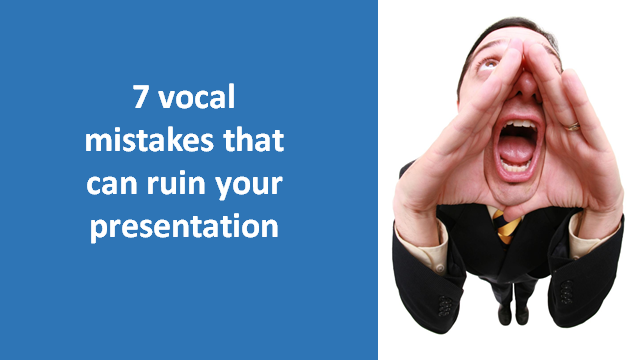What does your voice say about you? Whether you like it or not, people will make judgements about you based on your voice. They’ll make assumptions about where you’re from, how well educated you are or how confident you are.
Regardless of the words you speak, your voice will impact on how engaging a speech or presentation is for your audience and how well your message is received. Here are 7 vocal mistakes than can ruin your presentation:
Monotone
When my workshop participants discuss what makes a poor presentation, inevitably someone will mention how awful it is to listen to a presenter speaking in a monotone. It’s boring and tiring to listen to and it gives the impression that you’re not interested in what you are saying or that you don’t care about your audience.
Too Fast
When you speak too quickly it’s very difficult for your audience to keep up with what you’re saying. We often speed up our speech when we’re nervous or want to get a presentation over and done with but this doesn’t serve your audience. It will most likely be the first time they have heard your message and they need time to process the information you are providing.
Too Slow
Whilst it is important to slow down your speech when giving a presentation, speaking too slowly can be frustrating for your audience and sometimes make you sound uncertain about what you’re saying.
Too Soft
As a communicator, it is your responsibility to ensure your listeners can hear what you’re saying. Nothing is more frustrating than trying to hear someone who is not projecting their voice appropriately. It can make a presenter seem like they don’t care and also make you sound nervous and uncertain about what you’re speaking about.
Too Loud
People who speak slightly louder than normal are often perceived to be more powerful and confident; however, if you speak too loudly it can sometimes sound far too aggressive. It’s uncomfortable for people to listen to and you lose the nuances that help communicate your message.
Upward Inflection
An upward inflection at the end of a sentence will make what you’re saying sound like a question which can make you seem uncertain and undermine your credibility. Compare a downward inflection on “Hi, I’m Mel Sherwood” with an upward inflection on “Hi, I’m Mel Sherwood?” As an Australian I am very conscious of this common vocal trait!
Trailing Off
Whether it’s through nerves, habit or simply running out of air, many presenters start off a sentence with the right amount of projection and trail off as they end the sentence. Often this is repetitive which creates an undesirable rhythm and pattern that’s hard to break and difficult to listen to.
Are you making any of these mistakes? One of the best ways to find out, apart from asking someone, is to record yourself delivering your presentation and listen back to it (if you record it on video, make sure you listen back to the audio without the visual).
If you find you are making these mistakes, you’ll obviously need to add in some vocal variety to keep your audience engaged – varying the pace, the rhythm, the emphasis and the volume will help to bring your speech to life. You can do this consciously; however, the best place to start is to really connect with your material and fully express how you feel about it – keep it conversational and allow your passion and enthusiasm for sharing your message to give your voice the extra energy and variety required.
Mel Sherwood is a Presentation Skills and Personal Impact Speaker and Founder of The RED Effect™. She works with ambitious business leaders, teams and individuals who want to express themselves with confidence, credibility and charisma. An Australian based in Scotland, Mel is an award-winning speaker, author and coach and combines over 25 years’ experience in business with a background as an actor, presenter and singer.


